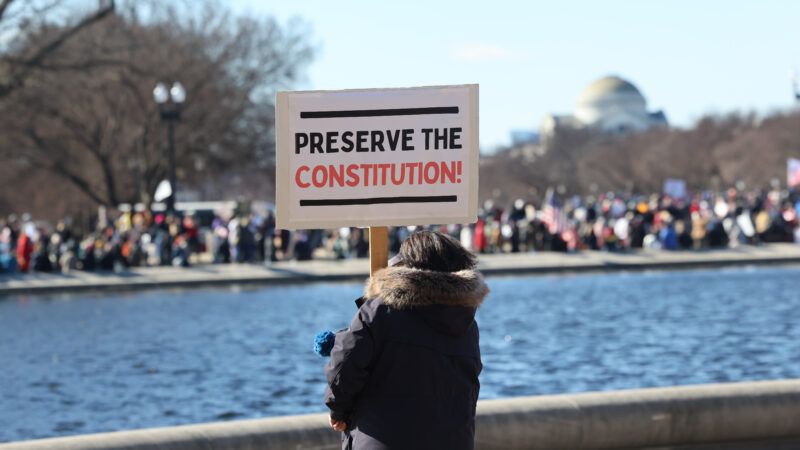DOGE Can't Slash Government Without Congress
The federal leviathan can’t be dismantled by executive action alone. To truly cut spending and rein in the bureaucracy, the administration needs buy-in from the branch that built it.

"It's a joke," a "waste of time": That was the Democratic line on the new Department of Government Efficiency (DOGE) just months ago. But ever since Elon Musk and his "baby-faced assassins" stormed the bureaucracy—mass-firing employees, zeroing out budgets, and tossing agencies "into the woodchipper"—the tune has changed. Now, DOGE is "an agent of chaos without limitation," per a lawsuit from Democratic state attorneys general. Worse, says Sen. Ron Wyden (D–Ore.), they're "seizing the tools they need for a coup."
Even some self-described libertarians are not at all amused by the Musketeers' hijinks. I'm at a loss: How are they not enjoying this? The whole thing plays like it was scripted by Ayn Rand, if Rand had a sense of humor.
Even so, I'm hoping DOGE provides something beyond entertainment value—I'd like it to work. But it won't, so long as the DOGEnauts believe they can cut trillions from the federal budget with executive action alone. To get the job done, DOGE needs Congress.
So far, DOGE has stuck to the go-it-alone strategy Musk and Vivek Ramaswamy outlined in The Wall Street Journal after the election: "driving change through executive action based on existing legislation rather than by passing new laws." But that's not how any of this works. Neither the president nor his proxies can summarily zero out agencies and departments for which Congress has provided statutory authority and funding. Even the MAGA-friendly Heritage Foundation acknowledged as much in a 2017 legal memorandum: "The power to enact, amend, or abolish these executive departments and agencies and their functions belongs to Congress." The DOGE team is finding that out the hard way, as their agency-killing plans get hung up in federal court.
President Donald Trump's team thinks they've found a work-around—an ambitious constitutional theory that lets the president nullify congressional appropriations he doesn't like. The last president to try that was Richard Nixon, and he didn't get very far. In his second term, when Nixon adopted an impoundment-on-steroids strategy, withholding billions in appropriated funds, he got slapped down, first by the courts, then by Congress. In 1974, Congress shut the door to future abuses by passing the Impoundment Control Act, which requires the president to get congressional approval before rescinding appropriations.
Key Trump officials, like Office of Management and Budget head Russ Vought, insist the Impoundment Control Act is unconstitutional. But historically, there's been little support for that view even among conservative legal heavyweights.
As an assistant attorney general in Nixon's Office of Legal Counsel (OLC), future Chief Justice William Rehnquist rejected the notion that the power of the pen trumps Congress' power of the purse. "It seems an anomalous proposition," he wrote in a 1969 memo, "that because the Executive Branch is bound to execute the laws, it is free to decline to execute them." The Reagan administration's OLC reached the same conclusion in 1988 saying, "There is no textual source in the Constitution for any inherent authority to impound." It's unlikely that the Supreme Court will discover one and hand Trump unlimited authority to impound funds.
That doesn't mean DOGE is doomed to nibble around the edges of a $7 trillion federal budget. While the president currently lacks broad authority to reorganize the executive branch, Congress could grant that authority. On February 13, Sen. Mike Lee (R–Utah) and Rep. James Comer (R–Ky.), introduced the Reorganizing Government Act of 2025, which would do just that—give the president sweeping power to restructure and downsize the bureaucracy, subject to a fast-tracked approval vote in Congress.
The bill reactivates statutory authorities enjoyed by multiple presidents from 1932 to 1984—but with a key difference. Past presidential reorganization acts typically barred the president from proposing plans to shutter whole agencies; this bill puts "entire executive departments, not just agencies" on the chopping block. If passed, it would give the administration clear authority to shrink the federal government—and shore it up against legal challenges.
Another reform bill from Lee and Sen. Rand Paul (R–Ky.) would advance DOGE's goals by "reclaiming legislative power from the regulatory state." As Musk put it last week, "You can't have an autonomous federal bureaucracy, you have to have one that is responsive to the people." The Regulations From the Executive in Need of Scrutiny (REINS) Act would require affirmative approval from Congress for major federal regulations, putting the administrative state under democratic control.
Musk is right: "We need to delete entire agencies" and rein in bureaucratic rule. But he's wrong to think he alone can fix it. The federal leviathan is a creature of statutory law and congressional appropriations. There's no dismantling it without buy-in from the branch that got us into this mess. Reformers on the Hill stand ready to help. The administration should take "yes" for an answer.


Show Comments (208)